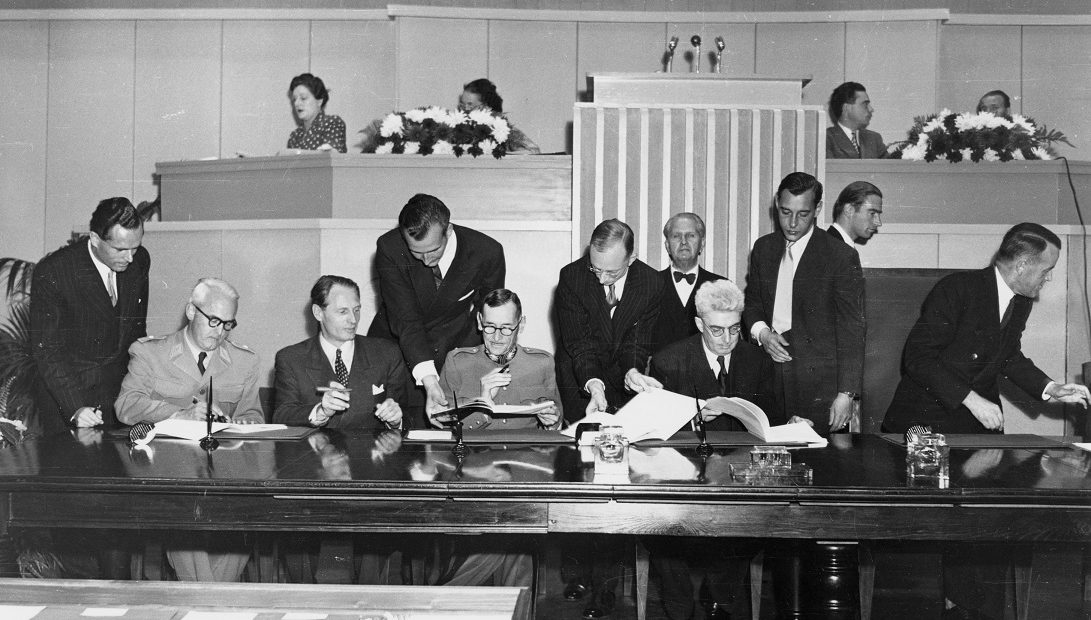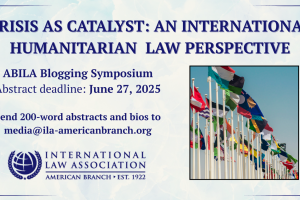The Trump Administration’s War on the Laws of War (IHL Symposium)

Signing of the Geneva Convention; International Committee of the Red Cross
This piece is part of the American Branch’s third blogging symposium, examining the ILW 2025 theme of ‘Crisis as Catalyst in International Law’ from an International Humanitarian Law perspective. The International Humanitarian Law Committee sponsors this symposium; however, the views expressed in published works are solely those of the authors.
The Trump Administration’s War on the Laws of War
by Gabor Rona*
The present-day Geneva Conventions were negotiated in the aftermath of WWII, a time of concentrated attention to the horrors of war. They are among the most widely ratified treaties in the world. The Geneva Conventions do not outlaw war. That was the job of the contemporaneous U.N. Charter. Rather, in recognition that wars happen, the Geneva Conventions and their Additional Protocols seek to reduce suffering in war by limiting the means and methods of warfare – for example, by prohibiting the targeting of civilians – and by establishing rules for the treatment of prisoners of war and civilians falling into the power of the enemy.
The Trump administration has taken several bold and misguided, indeed irrational, steps that, when combined, will leave more holes than substance to U.S. application of International Humanitarian Law (IHL, or the law of armed conflict). I will briefly and superficially touch on three areas of grave concern. I do not address what many consider the Trump administration’s most notorious violations against the international legal order, namely, the threats to use force against Canada, Panama, and Greenland (Denmark), and the use of force against Iran and Yemen, as those are jus ad bellum/U.N. Charter issues, not jus in bello/IHL issues.
PENTAGON (AND STATE DEPARTMENT)
Secretary of Defense Hegseth’s book The War on Warriors has been likened by one reviewer to Mein Kampf in its sense of persecution and doom, promoting a “contrived nightmarish vision of society, where true ‘patriots’ are persecuted by a twisted and evil political establishment…”. Hegseth seeks to save the military from ‘wokeism,’ by which he means things like the Geneva Conventions and accountability for war crimes. He actively lobbied for pardons for soldiers convicted of murdering persons hors de combat in Afghanistan. As Secretary of Defense, he fired the Judge Advocates General, the top military lawyers in each of the armed services, a decision at odds with customary IHL obligations to ensure legal advisors are available, when necessary, to advise commanders on the application of IHL, and on the appropriate instruction to be given to the armed forces. The obligation is also supported by the Geneva Conventions’ more general requirement that States Party shall “respect and ensure respect” for the Conventions.
Consistent with the desire to free the armed services from the constraints of law, the Pentagon has announced that it will terminate the Civilian Harm Mitigation and Response office, which deals with policy matters related to minimizing the risk to noncombatants, and the Civilian Protection Center of Excellence, which handles training and procedures.
Another disturbing piece of evidence that the Trump administration has abandoned its support for long-standing principles, rules, and practices of IHL is its withdrawal from this year’s Aspen Security Forum, a firmly establishment-oriented event that has featured high-level international and U.S. military and national security apparatus participation for the past 15 years. The mission of the Aspen Strategy Group (ASG), which hosts the Forum, is “to address key national security challenges and promote peace by convening decision-makers in resolutely non-partisan public and private forums.” In an abrupt turn-around, the Pentagon claimed that the Forum “promotes the evil of globalism, disdain for our great country and hatred for the president of the United States,” and that “(t)he department will remain strong in its focus to increase the lethality of our war fighters, revitalize the warrior ethos and project peace through strength on the world stage. It is clear that the A.S.F. is not in alignment with these goals.” The disdain for international legal obligations of armed conflict is apparent in these hostile remarks that are entirely divorced from the reality of the Forum’s purpose and content.
At the State Department, meanwhile, recent mass firings include the closure of the Office of Global Criminal Justice, which “helps formulate U.S. policy on the prevention of, responses to, and accountability for mass atrocities,” including war crimes, crimes against humanity, and genocide.
These IHL rules, the practices they mandate, and the mechanisms designed to implement them serve several functions. Obviously, they support the most important IHL principle: distinction between combatants and civilians. But rather than create a harmful constraint on armed forces, they are essential to the accomplishment of the military mission, the safety and psychological well-being of armed forces personnel, and indeed, the broader foreign policy interests of States. All these values are at risk when guardrails against the commission of war crimes are absent.
Responsible military leaders recognize the strategic value of IHL compliance, including the minimization of civilian harm. Hegseth, meanwhile, has it exactly backwards. What he considers to be woke constraints on the military are, in fact, essential components of protection for the military mission, the soldiers, and the political goals of the governments that put soldiers in harm’s way.
ISRAEL/PALESTINE
Whether or not one agrees with allegations that Israel is guilty of genocide in Gaza, there is no room to doubt that Israeli armed forces, and government officials, are responsible for widespread and systematic violations of IHL in Gaza and the West Bank. Notwithstanding the horrendous violations committed by Hamas in the October 7 attacks, notwithstanding Hamas’ cynical and illegal use of the civilian population to cover its military activities, and regardless of belief in Israel’s right to use force in self-defense, the evidence of Israeli violations is so thorough, from the targeting of civilians and civilian infrastructure, to the mistreatment of detainees, to the withholding of essential humanitarian aid, and to practices and policies that amount to de facto annexation of occupied territory, that I will not bother to recount the details here.
The point I want to make, once more, is about the obligation under the Geneva Conventions to “respect and ensure respect” for the Conventions. In this regard, the United States maintains several legal strictures concerning the prohibition of provision of military aid to foreign armed forces that violate IHL. The most well-known of these are the so-called Leahy Laws (named after my former Vermont Senator) – two statutory provisions prohibiting the U.S. Government from using funds for assistance to any unit of foreign security forces where there is credible information implicating that unit in the commission of gross violations of human rights. One statutory provision applies to the State Department, and the other applies to the Department of Defense. The obligation to enforce the Leahy Laws lies primarily with the Secretaries of State and Defense. In addition, as these are statutory provisions, Congress has considerable leverage in oversight and funding.
Israeli officials (incredulously given the history of the Holocaust) speak of “concentrating” Gaza’s population into “camps.” The Trump administration, meanwhile, supports the ethnic cleansing of Gazaand maintains its fictional belief that Israel “strictly adhere(s) to the laws of war.” It is thus essential to the sanctity of the Geneva Conventions’ “ensure respect” provisions, of IHL in general, and to the credibility of the United States in matters of foreign affairs, that Congress exercises its powers to compel enforcement of the Leahy Laws with respect to the provision of military support to Israel.
IMPUNITY
I have already mentioned the decision of the Trump administration to pardon members of the U.S. armed forces convicted of murder and other offenses that are, in fact, war crimes. In addition to such ad hoc pardons, U.S. policy appears to promote impunity on an industrial scale by actively thwarting the efforts of the single, permanent, international institution designed to end impunity for international crimes: the International Criminal Court (ICC).
By way of full disclosure, I note that I am a plaintiff in litigation contesting the Trump administration’s imposition of sanctions against the ICC. My complaint is that by prohibiting support for the ICC prosecutor, these sanctions violate my constitutional rights, for example, to file amicus briefs in support of the prosecutor’s position on legal matters, or to otherwise contribute to the work of the Court. Recently, a federal court granted a permanent injunction against the government’s enforcement of these sanctions against me and my co-plaintiff. But more importantly, the sanctions have been imposed for political reasons, rather than due to any credible argument that the ICC violates international law by purporting to exercise jurisdiction against U.S. persons, or allies, namely, Israel. It is true that neither Israel nor the United States are party to the Rome Statute, the international treaty establishing the ICC. However, the Statute is fully consistent with international law by providing the ICC with jurisdiction over crimes, including IHL violations, committed on the territory of a State Party, regardless of whether the perpetrator is a national of a State Party. U.S. complaints that the ICC violates the sovereign rights of non-State Parties when it prosecutes their nationals carry no more weight than the false claim that a state cannot prosecute a foreigner for an offense committed on its territory.
As improper as the ICC sanctions are, the Trump administration has now taken things one step further by issuing sanctions against the U.N. Special Rapporteur on the situation of human rights in the Palestinian Territory occupied since 1967, Francesca Albanese, whose task is not to prosecute or otherwise enforce any law, but merely to investigate and make recommendations. In clear violation of its obligations to respect freedom of expression under article 19 of the International Covenant on Civil and Political Rights, to which the United States is a party, U.S. sanctions do little to protect the legitimate interests of the United States or its nationals but visit great harm on the fight against impunity for IHL violations and the reputation of the United States as a promoter and protectors of human rights and IHL. Attempting to thwart the work of U.N. officials, and of the one permanent international institution designed to close the impunity gap that occurs when States are unwilling or unable to meet their Geneva Convention obligations, again, directly defies the obligation of all parties to the Geneva Conventions to “respect and ensure respect” for IHL.
The Geneva Conventions also obligate all States Party to search for and try or extradite for trial all persons suspected of having committed “grave breaches” of the Conventions in international armed conflict. To this end, U.S. war crimes law was recently amended to comply with the Conventions’ obligation to search for and try or extradite suspected war criminals, regardless of where they committed their crimes. This obligation is at the heart of recent prosecutions by Germany, France, Sweden, the Netherlands, Belgium, Switzerland, and Finland for war crimes in Syria, Rwanda, Iraq, Iran, and Liberia. Most recently, Belgian federal police arrested and interrogated two Israeli soldiers accused of war crimes in Gaza. This should be a warning to war criminals that even if they enjoy impunity in their home countries, they remain in jeopardy should they travel elsewhere.
CONCLUSION
Viewed separately, these policies and practices of the Trump administration represent misguided decision-making, contrary to the interests of the United States. Taken together, they suggest a concerted effort to unravel some of the most significant and hard-won threads of the international legal order that are designed to minimize suffering in armed conflict and to promote international peace and security. Despite the many criticisms leveled at IHL, there can be no doubt that in the more than one and a half centuries since the promulgation of the First Geneva Convention, and despite the horrendous violations committed in all the wars since that time, international law, and in particular, IHL, has matured into a comprehensive framework designed to minimize human suffering and harm to the planet. The tools are in our hands, and it is our responsibility to respect and apply them.
 *Gabor Rona is a Professor of Practice at Cardozo Law, Yeshiva University, and a Lecturer in Law at Columbia Law, with expertise in international human rights and international humanitarian law. Before his time at Cardozo, he was the International Legal Director of Human Rights First and a Legal Advisor in the Legal Division of the International Committee of the Red Cross (ICRC) in Geneva.
*Gabor Rona is a Professor of Practice at Cardozo Law, Yeshiva University, and a Lecturer in Law at Columbia Law, with expertise in international human rights and international humanitarian law. Before his time at Cardozo, he was the International Legal Director of Human Rights First and a Legal Advisor in the Legal Division of the International Committee of the Red Cross (ICRC) in Geneva.



